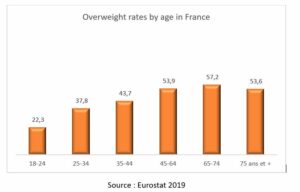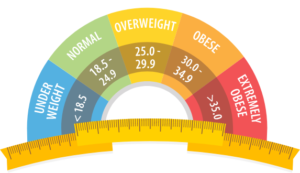More than half of European Union residents are overweight. According to Eurostat data from 2019, 60% of Germans aged 45 to 64 are overweight or obese, 3.3 points more than Belgians and 6.1 points more than French people in this age group. 66% of Germans aged 65 to 74 are overweight or obese, 3.4 points more than Belgians and 8.8 points more than French people in this age group. Of these three countries, France has the lowest proportion of overweight or obese people.
The national epidemiological survey on overweight and obesity carried out in France by Obépi-Roche since 1997 reveals a significant increase in the prevalence of obesity over the last two decades in the population as a whole. Among people aged between 45 and 54, who were between 35 and 44 in 1997, the increase is +3.2 points: 19.9% are obese today, compared with 16% 20 years ago. In 2020, the over-65s had a higher rate of overweight (37.4%) and obesity (19.9%) than the younger 15-24s, with 14.0% overweight and 9.2% obese respectively.
However, it is among young adults aged 15-24 that the increase in obesity over the years has been most marked, with a rise of 5.3 points in 10 years. On the one hand, these increases could be explained by the fact that the younger generations are more exposed to a modern lifestyle characterised by a more sedentary lifestyle, a dependence on screens and less healthy eating habits. Secondly, they are more likely to eat processed foods, rich in empty calories and added sugars.

Sedentary lifestyles and increasingly rich diets
Overall, it is the sedentary lifestyle that is causing the European population to gain weight. It leads to a reduction in muscle mass and therefore energy requirements. However, the population is not adapting its diet by reducing its intake and is eating richer foods: industrial food, ready-made meals, soft drinks, etc.
Today’s baby boomers, born after the Second World War, grew up at a time when eating habits and diets underwent profound changes: the end of rationing, mass production of meat, imports of new ingredients, widespread snacking, the proliferation of fast food outlets, and so on. These upheavals have had an impact on their health, with a general increase in BMI.
As people get older, they are exposed to problems that can accentuate or reinforce the risk of weight gain. For example, the onset of joint pain linked to osteoarthritis or osteoporosis can have an impact on mobility. Because they are in pain, people stop certain physical activities (taking the stairs, going for a walk, making short journeys on foot), without however reviewing their diet, thereby encouraging weight gain. Generally speaking, the body’s calorie requirements decrease with age, while its nutritional needs increase (in terms of calcium, proteins, etc.). Individuals do not necessarily adapt their menus to these changing needs, which can lead to weight gain.
What’s more, some drug treatments, such as most antipsychotics and antidepressants, are associated with weight gain. One in two people over the age of 70 in France takes psychotropic drugs.
The harmful effects of weight gain on health
Generally speaking, the risk of mortality linked to excess weight among people over 55 increases for those with a BMI of over 30.

Being overweight is associated with an increased risk of developing other illnesses, such as type 2 diabetes, respiratory disease, cardiovascular disease and some cancers (colorectal, breast, pancreas). Excess weight also encourages the onset of osteoarthritis, reducing mobility.
In addition to the health consequences of overweight and obesity, people are also faced with a growing stigma, also known as “grossophobia”. Being overweight is widely condemned by the general public, who consider the people concerned to be solely responsible for their condition. This gives rise to comments and judgements that have a negative impact on self-image and self-esteem.
Given the extent of the prevalence of overweight and obesity among senior citizens, and the consequences this can have in terms of illness, physical and psychological well-being, and the social support provided to the elderly, it is clear how important it is to tackle this health problem. However, this care must be backed up by prevention at younger ages, because slimming diets for the elderly can have serious consequences, with the risk of deficiencies in certain nutrients.
Source : Seniosphère Conseil
Also worth reading:



